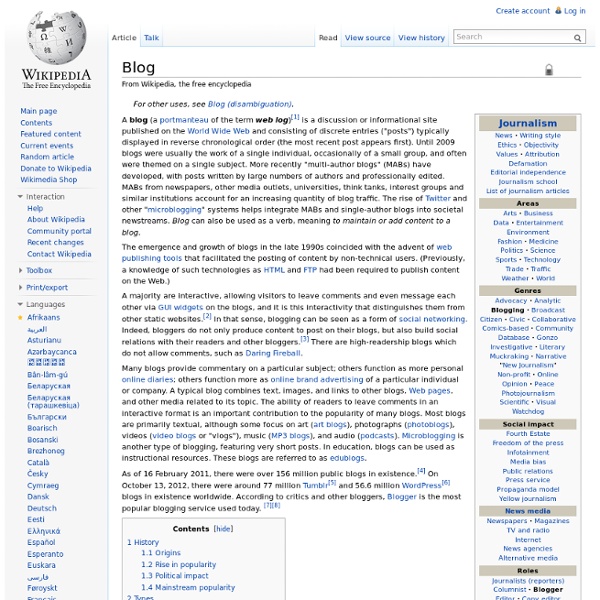Social bookmarking
Common features[edit] In a social bookmarking system, users save links to web pages that they want to remember and/or share. These bookmarks are usually public, and can be saved privately, shared only with specified people or groups, shared only inside certain networks, or another combination of public and private domains. Many social bookmarking services provide web feeds for their lists of bookmarks, including lists organized by tags. As these services have matured and grown more popular, they have added extra features such as ratings and comments on bookmarks, the ability to import and export bookmarks from browsers, emailing of bookmarks, web annotation, and groups or other social network features.[4] History[edit] A user page on del.icio.us in May 2004, displaying bookmarks with tags. Folksonomy[edit] A simple form of shared vocabularies does emerge in social bookmarking systems (folksonomy). Uses[edit] Enterprise bookmarking[edit] Libraries[edit] Education[edit] Abuse[edit] See also[edit]
Environment
Environment may refer to: It may also refer to: Built environment, constructed surroundings that provide the setting for human activity, ranging from the large-scale civic surroundings to the personal placesKnowledge environment, social practices, technological and physical arrangements intended to facilitate collaborative knowledge building, decision making, inference or discoveryNatural environment, all living and non-living thingsSocial environment, the culture that an individual lives in, and the people and institutions with whom they interactPhysical environment, in ecology In computing: Desktop environment, in computing, the graphical user interface to the computerEnvironment variables, the dynamic set of variables defined in a processIntegrated development environment, a type of computer software that assists computer programmers in developing softwareRuntime environment, a virtual machine state which provides software services for processes or programs while a computer is running
Wiki
Type of website that visitors can edit A wiki ( WI-kee) is a form of online hypertext publication that is collaboratively edited and managed by its audience directly through a web browser. A typical wiki contains multiple pages that can either be edited by the public or limited to use within an organization for maintaining its internal knowledge base. Wikis are enabled by wiki software, otherwise known as wiki engines. There are hundreds of thousands of wikis in use, both public and private, including wikis functioning as knowledge management resources, note-taking tools, community websites, and intranets. Ward Cunningham, the developer of the first wiki software, WikiWikiWeb, originally described wiki as "the simplest online database that could possibly work".[3] "Wiki" (pronounced [wiki][note 1]) is a Hawaiian word meaning "quick".[4][5][6] Characteristics Editing Source editing Layout consistency Basic syntax Visual editing Version history Edit summary Linking and creating pages Searching Notes
Visual arts
The current usage of the term "visual arts" includes fine art as well as the applied, decorative arts and crafts, but this was not always the case. Before the Arts and Crafts Movement in Britain and elsewhere at the turn of the 20th century, the term 'artist' was often restricted to a person working in the fine arts (such as painting, sculpture, or printmaking) and not the handicraft, craft, or applied art media. The distinction was emphasized by artists of the Arts and Crafts Movement, who valued vernacular art forms as much as high forms.[4] Art schools made a distinction between the fine arts and the crafts, maintaining that a craftsperson could not be considered a practitioner of the arts. The increasing tendency to privilege painting, and to a lesser degree sculpture, above other arts has been a feature of Western art as well as East Asian art. Education and training[edit] Training in the visual arts has generally been through variations of the apprentice and workshop system.
Social network
Social networks and the analysis of them is an inherently interdisciplinary academic field which emerged from social psychology, sociology, statistics, and graph theory. Georg Simmel authored early structural theories in sociology emphasizing the dynamics of triads and "web of group affiliations. Overview[edit] History[edit] In the late 1890s, both Émile Durkheim and Ferdinand Tönnies foreshadowed the idea of social networks in their theories and research of social groups. Levels of analysis[edit] Self-organization of a network, based on Nagler, Levina, & Timme, (2011)[32] In general, social networks are self-organizing, emergent, and complex, such that a globally coherent pattern appears from the local interaction of the elements that make up the system.[33][34] These patterns become more apparent as network size increases. Micro level[edit] Social network diagram, micro-level. Meso level[edit] Social network diagram, meso-level Examples of a random network and a scale-free network. In J.A.
Cinema
From Wikipedia, the free encyclopedia Cinema may refer to: In music:
Internet forum
An Internet forum powered by phpBB FUDforum, another Internet forum software package. An Internet forum, or message board, is an online discussion site where people can hold conversations in the form of posted messages.[1] They differ from chat rooms in that messages are often longer than one line of text, and are at least temporarily archived. Also, depending on the access level of a user or the forum set-up, a posted message might need to be approved by a moderator before it becomes visible. Forums have a specific set of jargon associated with them; e.g. a single conversation is called a "thread", or topic. A discussion forum is hierarchical or tree-like in structure: a forum can contain a number of subforums, each of which may have several topics. Depending on the forum's settings, users can be anonymous or have to register with the forum and then subsequently log in in order to post messages. History Internet forums are prevalent in several developed countries. Structure User groups Post
The World Weekly



